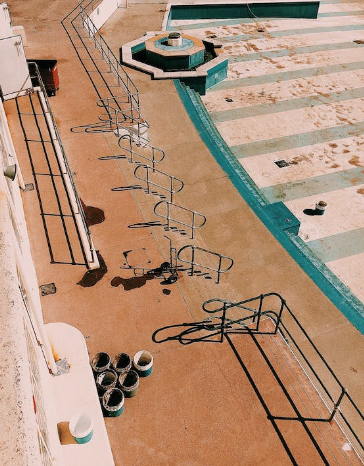Swimming is a great sport and physical activity that helps with many mental and physical health issues. If you or someone you know is pregnant or has joint problems, swimming can be the much-needed relief you’re looking for.
This may be one of the reasons why most Americans enjoy going topublic pools in their neighborhood to cool off. While this seems like a good idea because they charge a minimal fee and give you a sense of community, leading health experts have proved that public pools are a breeding ground for bacteria and parasites.
While it’s true that public pools are cleaned to keep people and swimmers from seriously falling ill, it’s likely that pool owners aren’t complying with these guidelines. As a result, people fall sick, kids get injured, and some individuals even lose their lives due to long-term exposure to pathogens, microorganisms, and germs.
Some germs and bacteria,such as cryptosporidium, are resistant to chlorine in the water,making it nearly impossible to have a clean public pool at all times.
If you aren’t convinced yet, keep reading ti�ll the end to find out the truth about how filthy public pools are and why you’re better off swimming in your own pool.

What Do Experts Say?
There are some guidelines and rules public and community facilities have to follow to ensure compliance with cleaning and sanitary standards. The Centers for Disease Control and Prevention (CDC) suggests that ineffective pool maintenance and low levels of disinfectants in public water bodies may promote the growth and spread of recreational water illnesses (RWI) that can lead to other complex health issues resulting from long-term exposure.
There is no absolute way to eliminate the risk of contracting RWIs. However, with the help of pool maintenance staff and public health officials, many people can enjoy community pools without sustaining collateral damage. Public pools are required to comply with the following rules.

- Preserving free chlorine levels between 1 to 3 parts per million.
- Testing disinfectant and water pH levels at least twice a day.
- Recording pH/disinfectant levels daily.
- Following manufacturer specifications and recommendations when considering water recirculation and filtration systems.
- Compliance with cleanliness and disinfection guidelines for locker rooms, restrooms, and showers.
- Removing slime layers on swimming pool tiles.
- Treating the pool using biocide shocks when the water is changed.
- Following disinfection guidelines in case of fecal or body fluid spillage.
- Promoting hygienic and safe swimming practices with the help of frequent bathroom breaks.
- Practicing equipment replacement and discard policies before their failure.
- Developing internal communication chains for staff members who may contract RWIs.
- Educating the staff and the public about RWIs and commonizing guidelines on how to use pools appropriately.
- Drain and refill the pool depending on the frequency of water usage.
- Implementing bathing load limits.
- Ensuring the water pH level stays between 7.2-7.8.
- Ensuring sufficient staffing when pools are busiest (on the weekends, holidays, et cetera).
- Acquire an authority-recommended operator and a chemical management training.

The Truth About Public Pools
Even with elaborate rules for disinfecting public pools, there is a lot not being addressed. Routine inspections by health professionals in different areas of Arizona, New York, Florida, Texas, and California revealed that many community facilities violated safety and health guidelines. Several facilities had to be sealed instantly and permanently, while others received a warning.
To clean pool surfaces, inquire about suitable cleaning detergents and frequency when you hire a pool builder or contractor. Listed below are a few detailed realities about what happens in public pools.

1. Urination
More people pee in the pool than you know, and while excited children might be the biggest perpetrators of this unsanitary practice, adults aren’t without blame. According to a Water Quality and Health Council study, one in five adults admitted to peeing in a pool. Not only is this unhygienic, but the bacteria released through such body fluids reduce the chlorine levels in the water, rendering it insufficient to deal with other contaminants.
2. Defecation
Although the CDC has a set of guidelines for public swimming facilities to help people avoid pooping in the pool, defecation is still a problem. Diarrhea is usually caused by microorganisms like E. Coli and other similar microbes. Upon testing filtered water from public pools, the CDC identified over 58% of the samples as positive for this diarrhea-causing organism.

3. Mouth Bacteria
It is common for people to gulp water in a swimming pool and spit it back out. People can infest the pool with disease-ridden microorganisms transferred through contact with saliva.
4. Bleeding
Swimming pool safety is yet another issue to nip in the bud. People commonly scratch against wobbly pool staircases or bump into other swimmers causing cuts and scratches that can lead to bleeding. Additionally, menstruation also contaminates pool water. In the case of insufficient levels of chlorine in the pool, microorganisms such as HIV or hepatitis B viruses may be found in water contaminated with blood.
5. Bathing
It is common for people to skip the pre-swim shower/rinse before jumping into the pool. Human skin carries dead cells, dust deposits, makeup, and sunscreen, all of which can act as contaminants. The culmination of sweat and filth from the human body might cause serious illnesses.

Public pool owners can ask professional pool designers for a separate shower area for swimmers before they jump into the pool. Pool contamination generates chloramines in the pool, a compound commonly known for stinging the eyes and irritating breathing passages.
Public pools are also highly unsafe for young kids, who at a higher risk of drowing. Pool water can go inside a child’s lungs, drowning them without the physical act of drowning actually occurring. Here’s how you can identify this:
- Developing a fever
- Heavy coughing or shortness of breath
- Experiencing unconsciousness
- Oral foaming or vomiting
- Changing skin tone
Due to infrequent cleaning, it is also common to find hair accumulated in the pool. Wet hair is brittle and more prone to breakage. It is not possible for hair to leave the pool even when filters are installed, so rest assured, only a thorough cleaning results in clean swimming water.
Additional Risk: Health Hazards
You can never be too sure about your community pool’s vigilance and compliance with safety standards. Fecal deposits from animals and even dead insects are also commonly found in pools. Animals commonly poop and pee in public swimming facilities, which worsens the problem. Other issues you can catch swimming in public pools include:

1. Skin infections
Swimmers in public pools may experience red, itchy spots on their skin along with blisters of pus surrounding their hair follicles. This condition is commonly known as a ‘hot tub rash’ and is identified as Pseudomonas by health professionals.
2. Severe or long-term diarrhea
Low chlorine levels in the water combined with accidental gulping while swimming interferes with stomach function, causing diarrhea. Long-term exposure to such grave conditions can lead to irreversible effects from a weakened immune system.
3. Eye infections
Your eyes don’t sting because of the chlorine in the water. The accumulation of several microorganisms in the pool causes problems when they come in contact with the eye.
4. Wound infections
If you have a cut or wound on your skin, avoid contact with water or public pools altogether. Germs and microorganisms in community pools can worsen your existing wound. Similarly, if you have sustained a cut, injury, or wound in the pool, it is best to get out of the water immediately to protect yourself and other swimmers from serious harm.
5. Ear infections
Ear infections contracted from public pools are often termed Swimmer’s Ear. Major symptoms of the problem include swelling of the ears, pain, itchiness, and maybe even pus oozing out of your auditory canals, as moist ear conditions are ideal for bacterial growth. Hence, experts suggest using ear plugs while swimming and ensuring to clean your ears properly after you are done.
6. Respiratory infections
When water gets into the respiratory tract, a bacteria called Legionella may cause pneumonia in the swimmer. Respiratory infections escalate quickly, and even though most issues can be sorted with the help of antibiotics, some don’t go away.
7. Injuries
A circular entrapment is a common situation that causes physical injury to swimmers. When an individual gets jewelry, hair, or even a limb caught in the drain of a pool, spa, or hot tub, they are said to suffer from a Circulation Entrapment Injury. This injury is just as common as it is painful, sometimes even leading to fatalities.
8. Tooth Damage
People who frequently swim may also experience tooth enamel erosion because of improper use of chlorine in public swimming pools. There are different brands of chlorine for water chlorination used to keep the water clean. However, this sometimes causes tooth discoloration and sensitivity that is irreversible. Accidental chlorine water intake that occurs throughout a swim session will cause tooth damage in the long run.
Additionally, unbalanced chlorine levels in the pool can also cause damage to the lungs and respiratory functions. People with long-term exposure to unsafe levels of chemicals are shown to suffer from damage to airway passages in the body.
7. Nervous System Issues
Exposed water bodies attract mosquitoes and insects. Some of these insects deposit illness-causing pathogens in the water that may cause dengue fever, yellow fever, and other serious cases like Zika.
Although a healthy level of chlorine level in the water is usually enough to tackle pathogens, germs, and microorganisms, poor pool maintenance and sanitation are equally responsible for making people sick. A private swimming pool eliminates several issues. Expert pool contractors equip you with the right tools to safeguard your pool, even if it is built in your outdoor living space. Ask them all about pool covers and tricks to keep your pool clean.

Conclusion
It is always better to be safe than to be sorry. Many people prefer public pools to save up on the cost of building a pool in their yard or garden, compromising safety and hygiene for their families. It is easier to clean it in a private pool, ensuring swimmers are taking showers before entering. You can regularly check for chlorine levels and even ensure the installation of equipment safely.
A good outdoor living space designer should be able to guide you thoroughly to ensure the safety of your family and other family members, so you get the best bang for your buck. Perfect Pools provides pool construction services from the planning to the execution step. We offer experienced pool contractors, landscape architects, and the latest pool designs so you can swim peacefully without leaving your house.
You can also contact us to find out more about our services offered in Sterling, Virginia, and check out our pool designs. We also offer free consultations to individuals seeking pool builders and outdoor pool designers. Make a healthy choice for you and your family without giving up on the benefits of swimming. We also offer several financing options for our clientele. If the idea of a private pool excites you, check out all about our finance schemes here.









